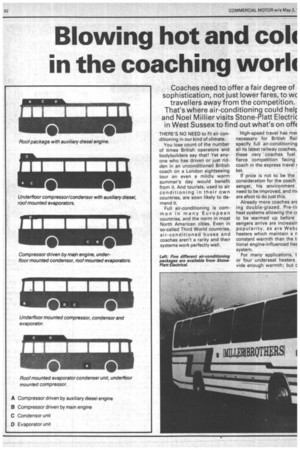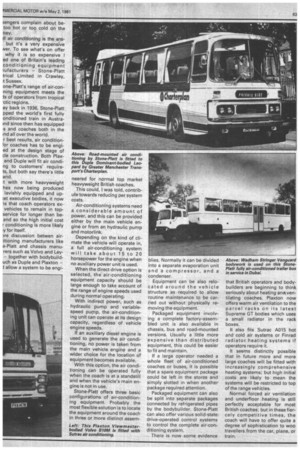• Blowing hot and cob in the coaching vvorh
Page 72

Page 73

If you've noticed an error in this article please click here to report it so we can fix it.
Coaches need to offer a fair degree of sophistication, not just lower fares, to wc travellers away from the competition. That's where air-conditioning could heir and Noel Millier visits Stone-Platt Electric in West Sussex to find out what's on offE
THERE'S NO NEED to fit air conditioning in our kind of climate.
You lose count of the number of times British operators and bodybuilders say that! Yet anyone who has driven or just ridden in an unconditioned British coach on a London sightseeing tour on even a mildly warm summer's day would benefit from it. And tourists, used to air conditioning in their own countries, are soon likely to demand it.
Full air-conditioning is common in many European countries, and the norm in most North American cities. Even in so-called Third World countries, air-conditioned buses and coaches aren't a rarity and their systems work perfectly well. High-speed travel has mac necessary for British Rail specify full air-conditioning all its latest railway coaches, these very coaches fuel fierce competition facing coach in the express travel r ket.
If price is not to be the consideration for the coach senger, his environment need to be improved, and mi are afoot to do just this.
Already more coaches are ing double-glazed. Pre-tic heat systems allowing the c( to be warmed up before sengers arrive are increasin popularity, as are WebE heaters which maintain a n constant warmth than the ti tional engine-influenced he system.
For many applications, t or four underseat heaters vide enough warmth; but c • sengers complain about betoo hot or too cold on the ney.
ill air conditioning is the ans but it's a very expensive iver. To see what's on offer why it is so expensive I ed one of Britain's leading conditioning equipment iufacturers Stone-Platt trical Limited in Crawley, I Sussex,
one-Platt's range of air-conning equipment meets the Is of operators from tropical .ctic regions.
ay back in 1936, Stone-Platt pped the world's first fully onditioned train in AustraInd since then has equipped s and coaches both in the ind all over the world, r best results, air condition'or coaches has to be engied at the design stage of cle construction. Both Plaxand Duple will fit air conding to customers' requirets, but both say there's little and.
t with more heavyweight hes now being produced lavishly equipped and upet executive executive bodies, it now is that coach operators exvehicles to remain in topservice for longer than beand so the high initial cost r conditioning is more likely y for itself.
)re discussion betwen airitioning manufacturers like e-Platt and chassis manurers such as Volvo and Leytogether with bodybuilduch as Duple and Plaxton — ;I allow a system to be engi neered for normal top market heavyweight British coaches.
This could, I was told, contribute towards reducing per system costs.
Air-conditioning systems need a considerable amount of power, and this can be provided either by the main vehicle engine or from an hydraulic pump and motorlink.
Depending on the kind of climate the vehicle will operate in, a full air-conditioning system will take about 15 to 20 horsepower for the engine when no auxiliary power unit is used.
When the direct drive option is selected, the air-conditioning equipment capacity should be large enough to take account of the range of engine speeds used during normal operating.
With indirect power, such as hydraulic pump and variablespeed pump, the air-conditioning unit can operate at its design capacity, regardless of vehicle engine speeds.
If an auxiliary diesel engine is used to generate the air conditioning, no power is taken from the main vehicle engine and a wider choice for the location of equipment becomes available.
With this option, the air conditioning can be operated fully when the coach is at a standstill and when the vehicle's main engine is not in use.
Stone-Platt offers three basic configurations of air-conditioning equipment. Probably the most flexible solution is to locate the equipment around the coach in three or more distinct assem blies. Normally it can be divided into a separate evaporation unit and a compressor, and a condenser.
Equipment can be also relocated around the vehicle structure as required to allow routine maintenance to be carried out without physically removing the equipment.
Packaged equipment involving a complete factory-assembled unit is also available in chassis, bus and road-mounted versions. Usually a little more expensive than distributed equipment, this could be easier to fit and maintain.
If a large operator needed a whole fleet of air-conditioned coaches or buses, it is possible that a spare equipment package could be left in the stores and simply slotted in when another package required attention.
Packaged equipment can also be split into separate packages connected by refrigerated pipes by the bodybuilder. Stone-Platt can also offer various solid-state drive-operated control systems to control the complete air-conditioning system.
There is now some evidence that British operators and bodybuilders are beginning to think seriously about heating anciNventilating coaches. Plaxton now offers warm air ventilation to the parcel racks on its latest Supreme GT bodies which uses a small radiator in the rack boxes.
It also fits Sutrac A015 hot and cold air systems or Finrad radiator heating systems if operators require it.
It seems distinctly possible that in future more and more large coaches will be fitted with increasingly comprehensive heating systems; but high initial costs are likely to mean the systems will be restricted to top of the range vehicles.
Normal forced air ventilation and underfloor heating is still perfectly acceptable for most British coaches; but in these fiercely competitive times, the coach will have to offer quite a degree of sophistication to woo travellers from the car, plane, or train,
















































































































